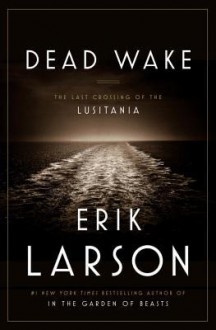

Sometimes, when one reads non-fiction, it's tempting to skip the "Notes" - especially when the narrative has been as carefully crafted as Larson's. The great majority of novels don't need footnotes, and his nonfiction practically reads like a novel.
But in this case, read the "Notes" section. There's an Easter Egg, a tidbit, an anecdote, a diversion, or a little story on practically every page. Like DVD extras. Stuff that would be awkward in a fast-paced war journey but right in place in a giant list of whatnot.
-cg

I work at a university. Over the past year, we've been working with a new strategic plan, as an organization, and the first, most vital point of that plan has been a discussion of liberal arts, a passion area for me. Far too much is happening, and there are far too many ideas to discuss here - plus, I want to tie this column directly to a book - so I'm going to narrow in.
I talk a lot with my students about the value of liberal arts (liberal, I remind them, in this case means "broad," not necessarily "left"). The specific, tangible benefits of liberal arts often need to be enumerated, because they're less obvious than in the professional or vocational disciplines. But every scholar of the liberal arts know that the intangible benefits of the education are where your heart goes.
Sometimes, in my reading, I run across some statement that makes me sit up and say, "Yes! This is liberal arts. This is what happens when you open yourself up broadly to the gifts of learning." I'm going to quote a few sentences from Vera Brittain's "Testament of Youth" here. Her moving memoir is a bildungsroman from a female (before the late 20th century, not a common thing at all), and a profound meditation on what happened to the youth of Britain, an entire generation decimated and affected primally and permanently by The Great War.
With students investing so much in their educations these days, words like these help us and inspire us to continue the good fight for liberal arts:
(If you're following along at home, this is from pages 30-31of the 1934 American edition, published by Macmillan.)
"I suppose it was the very completeness with which all doors and windows to the more adventurous and colourful world, the world of literature, of scholarship, of art, of politics, of travel, were closed to me, that kept my childhood so relatively contented a time. Once I went away to school and learnt--even thought from a distance that filled me with dismay--what far countries of loveliness, and learning, and discovery, and social relationship based upon enduring values, lay beyond those solid provincial walls which enclosed the stuffiness of complacent bourgeoisdom so securely within themselves, my discontent kindled until I determined somehow to break though them to the paradise of sweetness and light which I firmly believed awaited me in the south."
-cg

A few weeks ago, I saw the new adaptation of Vera Brittain's "Testament of Youth." I read the book in anticipation and absolutely swooned. The movie lived up to my reading. Read what I thought of the book here: http://carissagreen50.booklikes.com/post/1228703/new-literary-hero-vera-brittain.
Alicia Vikander's performance was luminous, and it was nice that she wasn't a sex android in this film. (Of course all of the boys who drooled over her in "Ex Machina" probably ignored this picture.) She was beautifully dressed in period costume. If I owned the rose-pink dress she wore in the graduation scene, I'd never take it off.
There were a few differences from book to movie - mostly to condense the events of the war into a coherent time-sensitive narrative. Malta disappears completely. Vera finding her brother in the field hospital in France never happened. And the scenes at the swimming hole the frame the story are basically a convenient narrative invention. But who cares? It was so beautiful and glorious.
-cg